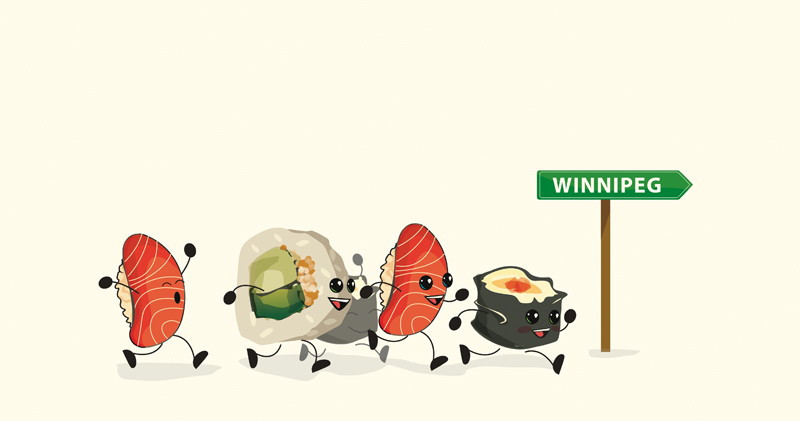Sushi in the city
The Japanese dish is more popular than ever in Manitoba’s capital, but why?
The seven blocks that make up Corydon Avenue used to be full of Italian restaurants, but now it seems that Little Italy is taking on a decidedly different flavour.
For every Italian spot that closes, a sushi bar opens.
So, why is Little Italy becoming Little Japan?
The popular Japanese dish – made with vinegared rice, topped with other ingredients, mostly seafood but also sometimes vegetables or other meats, and then wrapped with dried and pressed seaweed – has gained popularity in the West in recent years.
In fact it’s become such an epidemic the Japanese department of agriculture has organized the “sushi police” to award certification to Japanese restaurants in other countries who meet their standard of “pure Japanese.”
In Winnipeg, sushi places have sprung up across the city faster than rice in a rice paddy. While there are restaurants that have had firm roots planted in Winnipeg for years, consider some of the restaurants that have opened recently.
Yiho Sushi opened on Sherbrook Street and is part of a revitalization of that West Broadway strip.
In St. James, Sei Sushi’s bold, black façade and signage is impossible to miss on Portage Avenue, while Dae Gill Sushi sits quietly, tucked at the back of a small parking lot on Ness Avenue just before Polo Park.
Asahi opened up in Charleswood last year.
Just to name a few.
“I suspect that its popularity has something to do with an emphasis on healthy and low-calorie eating, but that’s only a guess,” said Marion Warhaft, the stealthy food critic for the Winnipeg Free Press.
But what does it say about Corydon’s disappearing dominance as the hotbed for all things Italian?
“It is not the case of the original owners switching to something different, but of the original owners getting older and retiring, owners getting older and in some cases dying and consequently businesses being sold,” Katia von Stackelberg, the executive director of the Corydon Avenue BIZ, explained in an e-mail.
“Presently we have a couple of Italian businesses which are on the market for sale, one of them because the owners are getting older and want to retire.”
Von Stackelberg explained the fate of three Corydon Avenue businesses: the original owner of Mamma Mia’s Ristorante died, and the restaurant was sold to another Italian family, and then sold to Kenko Sushi who also subsequently sold it.
“ The Japanese department of agriculture has organized the “sushi police” to award certification to Japanese restaurants in other countries who meet their standard of “pure Japanese”
The 74-year-old owner of Monviso Ristorante Italiano retired and sold his restaurant to Kahans Mongolian B.B.Q. Grill, and the owner of Ciao Caffé retired and sold his business to Hanabi Japanese Restaurant.
Terry Gereta, owner of Mise Restaurant, seemed to agree with von Stackelberg’s conclusion that business is business.
“It could be that people move on. I mean, there used to be a lot of delis in the North End and now there’s none,” he said.
“Now they’re sort of scattered around the city where they used to be concentrated, just like the Italian restaurants used to be concentrated in the Corydon area. But maybe they’re scattered and maybe the same thing will happen to sushi.”
Gereta adds that the proliferation of sushi on the strip hasn’t affected Mise’s business at all.
“Because we’re not a sushi restaurant and there are so many sushi restaurants when you’re driving down the strip, you know, we’re not in competition with them.”
If business is business, and sushi is the food trend of the moment, sushi could go the way of the delis in the North End.
Case in point: the Lobby on York.
When the swanky restaurant first opened in May 2009, it had a stylish sushi bar.
It stopped serving the Japanese dish back in January, according to Shan Shuwera, the restaurant’s general manager.
If you’re looking to make your own sushi, join the father of the sushi craze in Winnipeg, chef Sadao Ono of Edohei Restaurant, for an evening of authentic Japanese appetizers, soup and hands-on sushi making. Oct. 18, Nov. 22 or Jan. 24 at the Food Studio at 3200 Roblin Blvd. from 6:30 p.m. to 9:30 p.m. Cost is $68.25 per person. Visit www.foodstudio.net for info.
Published in Volume 65, Number 7 of The Uniter (October 14, 2010)







